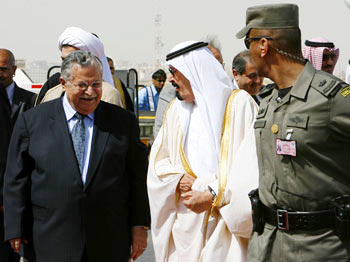| Home / International / Photo News | Tools: Save | Print | E-mail | Most Read |
| Saudis Hope to Rally Arab 'Moderates' at Summit |
| Adjust font size: |
This week's Arab summit will crown months of intense Saudi diplomacy aimed at dousing the flames of radicalism in the region and promoting the once insular oil state as a US-backed "leader of the Arabs." Riyadh has watched with concern as non-Arab Shi'ite Muslim Iran spreads its influence in Iraq, Lebanon, and the Palestinian territories, where Washington's prestige has waned over the past year with its failure to pacify Iraq. Analysts say the two-day summit that opens today is a chance for US-backed Sunni Arab states to assert themselves. Their effort will focus on a revived Arab peace initiative, namely a Saudi land-for-peace plan that the Arab League adopted in 2002 but which Israel and the United States have previously ignored. Arabs across the political spectrum have long argued that the decades-old conflict is a festering wound at the heart of the region's problems, the key to marginalizing radical ideologies and developing democratic political systems. Sunni states including Saudi Arabia, Egypt and Jordan considered "moderate" by the United States because they favor a realist policy of accepting Western ground rules for resolving the Arab-Israeli conflict are keener than ever to see it end. "Who in the Arab world is ready to go into a peace plan with Israel on behalf of everyone?" said Ahmed Shalan, a columnist in Saudi-owned Arab daily al-Hayat. "The role of leadership in the Arab world falls on Saudi Arabia, which certainly did not seek to obtain it. This role, which is a great challenge, carries enormous consequences." In February, Saudi Arabia brokered a deal creating a Palestinian unity government and ending months of infighting. It is also trying to mediate in Lebanon between opposition forces led by pro-Iranian Hezbollah and the Western-backed government. Saudi-owned Arab media have heavily promoted the summit, and Riyadh is festooned with flags, flowers, and slogans such as "Unity behind a just cause provides strength," and "Welcome to the country of peace and humanity." Dubai-based analyst Mustafa Alani said Arab states were in a relatively strong position because of US difficulties in Iraq and Israel's failure to crush Hezbollah in a war last year.
Arab nationalist and Islamist groups across the Arab world have long regarded the insular desert state with disdain as the country whose rulers have done more than any other to ensure US political and military influence in the region. They contrast this with the power to challenge Western policy that Saudi Arabia could have wielded via its vast oil wealth and prestige from housing Islam's holiest sites. Only once before has Riyadh hosted an Arab summit. That was in 1976 and Saudi Arabia had initially declined to host this year's summit until it reversed its decision in January. "Saudi Arabia has been reluctant to play a leading role, and they had wanted to marginalize the Arab League," said Abdel Bari Atwan, Arab nationalist editor of the al-Quds al-Arabi newspaper. "Now, suddenly, they changed their minds because of American pressure, not because they are willing. The US turned to them and said 'you are our ally, please do something'." (China Daily via agencies March 28, 2007) |
| Tools: Save | Print | E-mail | Most Read |
 |
| Related Stories |
 |
 |
|
 |
| Links |
